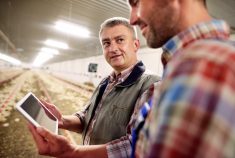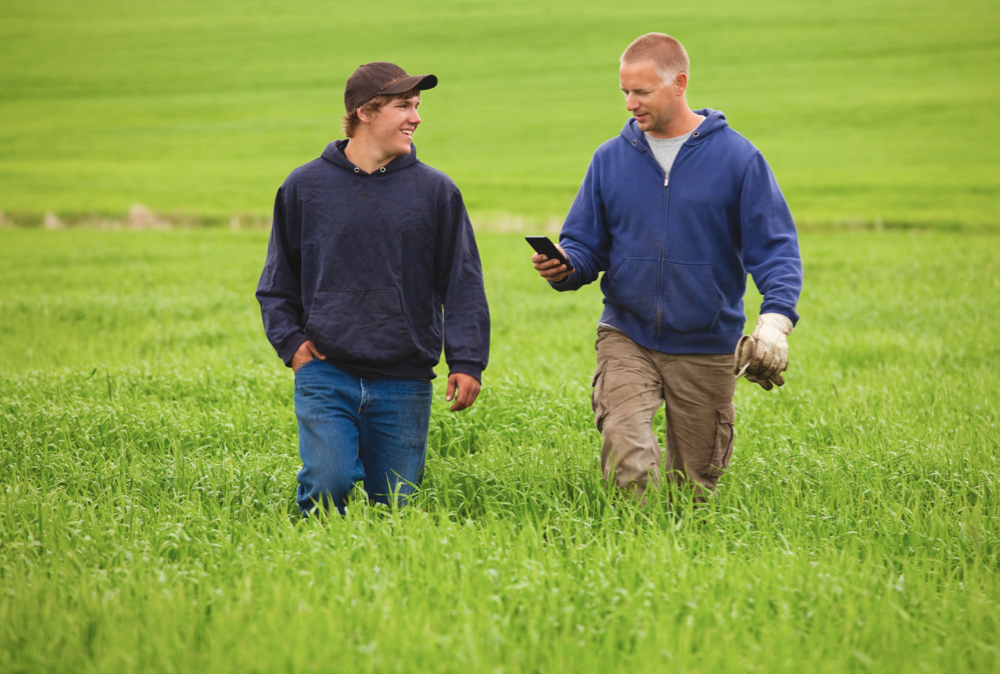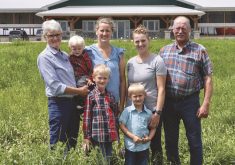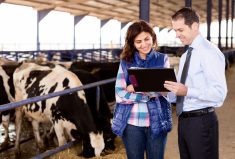Ben Campbell thought participating in a mentorship program could probably provide fresh insight into how to improve his grass-fed beef operation. Or possibly it could expose him to new business practices and stronger management techniques.
So by the end of the year-long program, it came as a surprise to the Alberta rancher when he realized his mentorship experience had had an impact on every aspect of his farm, his life and his work, far beyond his original expectations.
It even helped him understand the importance of family on the farm.
Read Also

Riding the tariff rollercoaster
Farmers are accustomed to roller-coaster years. But the current geopolitical windstorm is something else entirely. On his cattle operation near…
Campbell, owner of Grazed Right, had gone into the 2015 Cattlemen’s Young Leaders program with goals and a roadmap in mind, although he now believes it was his flexibility and being open-minded that allowed him to get the most out of the mentorship program, which paired him with Dylan and Colleen Biggs at TK Ranch near Calgary.
“I sort of had two mentors, they were a married couple, so I got mentorship on marriage and how to manage stress as well,” says the 32-year-old husband and father of three.
“It’s very difficult running a new business, and we just had our third child,” he now recognizes. “Having small children and a new business — and animals which are unpredictable and weather which is unpredictable — it can be very stressful.”
Campbell didn’t think stress management would even come up in their discussions on grassland management or in their talks about pasture elevation, but he is glad he found a way to take advantage of it when it did.
“It was something that I didn’t think I needed help with,” says the rancher, but he came to see that he was taking his stress home with him. Campbell had originally planned to become an engineer before launching his own enterprise. While business management, goal setting and financial planning were at the forefront going into the mentorship program, Campbell emphasizes that it was the ability to think outside the box and re-evaluate the mentorship plan that was crucial to making the whole experience a successful one.
In fact, it turns out that a lot of the benefit of a good mentorship program hinges on the key things a mentee can do to enhance the experience and become a better farmer — and person.
“I would say, have a plan and be willing to change that plan,” Campbell says. “You need to have a plan to have some direction. Otherwise you’re going to waste your time.
“But you also need to be willing to change your plan because you’re going to have a whole bunch of new stuff that you wanted to cover, and other stuff that turns out wasn’t that important.”
On the other side of the country, Adam MacLean took a more informal approach to being mentored, often looking to those who had hired him for guidance. However, the newly minted shepherd agrees that having a plan is crucial for anyone thinking about working with a mentor, as is being flexible enough to change direction.
Being able to challenge your own assumptions about what you want is absolutely crucial to fully benefiting from a mentorship, MacLean says.

When MacLean started looking at a career in agriculture, the self-described ecological entrepreneur didn’t have any inkling he’d eventually end up on Prince Edward Island with a flock of sheep. If not for the guidance of mentors, he could have tried a sub-tropical market garden.
“I’ve experienced a number of different types of agriculture over the last six, seven years,” says MacLean. “I didn’t start with sheep, but there was just a certain point when I realized I wanted to run a grass farm, a pasture-based livestock farm using holistic management.”
It was a point he reached with the help of mentors, as they worked with him to evaluate and challenge his ideas about what he really wanted out of farming. In the early years, MacLean thought market gardening would be the way to go and he even spent time on horticulture operations in Australia, Thailand and the Northern Fijian Islands before returning to Canada’s East Coast.
But after some guidance and several months bouncing thoughts off his mentor, it seemed right to change his focus to grazing.
MacLean says all of his experiences helped him start honing in on the type of farm business he wanted to invest in, but it was when he met John Duynisveld that he got down to the nuts and bolts, committing to livestock management as his path forward.
“Once I realized that that’s what I wanted to do, well, that’s how I met John, my mentor and my former employer,” MacLean says. “He was doing a delivery run to Halifax one day so I called him and started pestering him with a pile of questions about his operations and then he offered me a job. He was looking for someone to take on some responsibility there so I went for a visit. We talked things through and, yeah, that is how it all began.”
While MacLean doesn’t remember the word mentorship actually being used in the lead-up to him joining Duynisveld’s team at Holdanca Farms in Nova Scotia, he says it was obvious from the beginning that mentorship would be an important aspect of the arrangement.
“I made it really clear that my primary motivation for taking on the job would be the experience as much as the pay. So it was all really clear from day one,” MacLean stresses. “I wanted to learn as much as possible and in my experience I learned that I learn best by just doing it.”
But none of it would have worked if he and his mentor hadn’t been able to have a personal connection.
Meanwhile, Tom Lobsiger was studying equine management as part of his bachelor of bio-resource management degree at the University of Guelph when he discovered mentorship, and he agrees that having the right mentor is absolutely one of the most important factors in determining how successful a mentorship will be.
“Mutual trust and respect are the biggest things for sure,” Lobsiger says. “Having an open mind, and acting respectful towards your mentor is a good starting point. If you don’t trust or respect your mentor to be honest and respectable, you’re not going to believe what he’s saying. The same goes for your actions as a mentee. If you don’t treat your mentor as such, you will simply not get exposure to the same type of learning environment. Why should he go the extra mile to help you understand something, when you’re not really listening in the first place?”
Like Ben Campbell, Lobsiger’s mentor was Dylan Biggs at TK Ranch. However, it was Farm Management Canada’s now defunct STEP UP program that brought them together (before a funding shortfall resulted in the program’s closure in 2013).
Lobsiger adds that even a good mentor might not be the right fit for every mentee.
“You do have to be careful who you choose as a mentor. If you get paired with someone who is hard to get along with, is doing something you are not interested in, or doing things in a way you do not agree with, you’ll have a tough time learning positive things,” Lobsiger says. “Maintaining a good relationship with your mentor is the most important thing that will determine how well your experience as a mentee will turn out.”
In formal programs like STEP UP, where mentees may stay on a mentor’s farm for an extended period of time, learning how to get along with other employees and the mentor’s family is also an important part of the experience, which helps prepare young farmers for the challenges ahead.
But with the benefit of hindsight, Lobsiger believes he could have gotten more out the time he spent living and working on the TK Ranch.
“(Dylan) had a habit of bringing in people from the WOOFing program. Some were nice, some weren’t. He also had four daughters, some of which were easy to get along with and others not so much. In a sense, there were times when it was far from a one-on-one learning environment,” he says. “If I knew then what I know now I might’ve had more positive interaction with the people besides Dylan.”
That said, the owner of Okanagan Horsemanship emphasizes that the mentorship was a success and a big part of what allowed him launch his own business in 2015.
“Dylan was a great mentor. He had a very patient and open personality, which are always great qualities to have yourself and also makes it much easier to discuss things and learn the hows and whys of something,” Lobsiger says. However, looking back, there was more he could have gleaned from other participants.
“I wish I would have been able to return for a third season,” he adds.
In the cases where mentorships fall apart and ultimately fail, Ben Campbell believes it’s almost always because there is a breakdown in the relationship between the mentor and the mentee. Usually that arises because either the mentor or the mentee don’t or can’t commit the amount of time actually needed to achieve goals, he says.
In Campbell’s case, he often stayed over at his mentor’s farm when visiting to get the most out of the 700-kilometre round trip. But even so, not everything was face-to-face. Campbell and his mentor also relied on texting, email and phone calls to fill in the gaps between visits and keep things current and up-to-date.
“You can’t just meet four times a year for a full day. It’s way better to talk via text or phone or email five times a month or whatever for 12 months,” he says. “It is a big commitment of time for everybody.”
One final piece of advice on cultivating the mentor/mentee relationship, “Maybe buy lots of whiskey or something — my mentors both drank scotch,” Campbell says with a laugh.
MacLean says his ability to not just get along with, but also connect and trust his boss and mentor led to a second year in their arrangement.
“I wouldn’t have stuck around for a second year if we didn’t get along,” he says. “I mean, right now I’m in contact with him two or three times a week. Just texting back and forth questions.”
But the relationship has also evolved, after researching countless breeds of sheep for his own operation, MacLean has now been able to offer advice and guidance to his mentor, opening up a two-way street with benefits and growth for both parties.
“Now that I have this experience, this training, we work together,” he explains, noting that after reviewing his business plan his mentor picked up some of his own ideas, incorporating them into his business along with a few extra sheep. “I developed a business plan for myself and then gave it to him to review and provide critical feedback, and you know, I guess his vote of confidence in the business plan came when he decided to expand his own flock as well.”
All three young farmers agree that a good mentorship will also outlive any formal agreement, leading to lifelong connections and friendships, helped along by new methods of communication and social media.
And while it might seem like the short road to seek mentorship from someone in your own family, Campbell stressed that it was having someone outside the family to challenge his thinking that made his mentorship so valuable. While a lot of knowledge is passed on through farming families, from one generation to the next, that knowledge can also bring baggage and entrenched ideas about business, he says.
“It makes the relationship a professional one,” says Campbell. “I know that I can’t give advice to anyone that’s related to me, they’d tune me out immediately, but someone else can give advice to them easily.”
The idea that things are done a certain way because that’s how they’ve always been done is one that regularly takes hold in farm businesses — unless producers actively challenge the mindset, he adds.
“You hear things like, ‘that’s what my dad and that’s what his dad did and we calve in March,’” Campbell explains, adding more questions need to be asked in any successful farm business. “Well, why do you calve in March? Have you done a cost prediction analysis? Have you done a financial analysis? Why you should calve in March or April? Why do you keep replacement heifers? Why do you keep replacement heifers instead of buying them? Did you do a cost analysis of buying them versus keeping your own? And people almost never do that. So you’ve got to get experience outside of your own family or else you’re not going to be doing things properly and your ranch is going to fail.”
Going one step further, MacLean adds that it can also be helpful to look outside of agriculture altogether when seeking mentorship.
“I have a little network of mentors I’m developing. I’ve got farmer mentors such as my former employer, but I’m also really looking for people outside of the farming community… people from other business backgrounds,” says the shepherd. “I think that’s really important. We can’t get too stuck in our silos pretending that farming is different from every other business. Obviously, yes, it is different in a lot of respects, but especially when farmers are taking that step to start a business, I’d recommend that we look outside of agriculture as well for mentorship.”
Even looking for a mentor engaged in a different type of agriculture can help a young farmer cultivate new ideas. For Lobsiger, seeing the ins and outs of the cattle industry helped steer him towards an equine enterprise, one where he trains young horses and coaches riders.
“We talked a lot about the challenges a small beef producer faces, especially consumer choices and regulatory challenges. In a sense, he opened my eyes to how the beef industry works, before I actually started a cattle business of my own,” says Lobsiger. “Maybe partly because of that, or partly because I’m a horseman first and a cattleman second, I ended up much more in the horse industry than in the beef industry.”
But all of the mentees urged other young or new farmers to give mentorship an open mind and investigate the options that exist, or reach out to someone whose business and farming skills they admire.
“It’s so valuable, especially for someone’s that’s new to agriculture — we need to get new blood into agriculture,” Campbell says “There’s nothing wrong with old blood, but there’s a lot of people where the next generation doesn’t want to work on the ranch and you have to get someone new in. And it’s so difficult to just do that on your own. Mentorship can help with that.”















